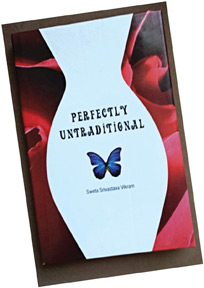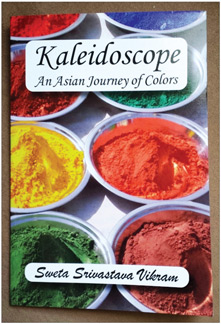|
Interview
An author of unshakeable convictions
by Dilshan Boange
In this era where a global media culture is now sweeping across
oceans and national borders believing that the pen is mightier than the
sword can surely open paths that lead to spectacular accomplishments
that the rawness of steels could never fulfil when the need for
sensitivity and sincerity through words is what matters.
 Sweta Vikram is a writer who has proven her prowess in the written
word as a poetess, an essayist and novelist with an impressive body of
work which is continuing to grow. This widely travelled New York based
writer of Indian origin has several academic credentials to her name
among which is a Masters in Strategic Communications from the Columbia
University, USA. Sweta Vikram is a writer who has proven her prowess in the written
word as a poetess, an essayist and novelist with an impressive body of
work which is continuing to grow. This widely travelled New York based
writer of Indian origin has several academic credentials to her name
among which is a Masters in Strategic Communications from the Columbia
University, USA.
A columnist for several periodicals related to literature and also an
educator in creative writing Sweta has taken part in over 100 literary
fora and 10 writing residency programs to date. Her book No Ocean Here
which was nominated for the Pushcart Prize has become part of social
issues campaigns and is now ranked #15 on Amazon. Com under Asian
American Poetry.
In an interview with the Sunday Observer’s Montage the prolific
writer and multifaceted activist Sweta Vikram gives insight about her
craft and her journey in the world of writing.
Exerpts:
Question: You have published nine books to date. That is a
quite a notable volume of work. There is more on the cards I presume.
But before going into discussing your work as a poet and novelist, I’d
like to ask about the cultural environs that would have shaped your
creative pulse. India, North Africa and the USA have all been home to
you. What can you say about living in these three very different parts
of the world from a point of socio-cultural experience?
Answer: There are two more books that are upcoming so 11 in
all. I appreciate the global exposure that I got very early on in my
life. My love for travel and desire to understand the world through
cultures and cuisines started very young. My parents worked very hard to
ensure my brother and I got the best of everything. What I am trying to
say is that instead of feeling like a child of displacement, I felt
gratitude for my life and living in different parts of the world. It’s
made me a better person, an optimist, and a survivor, whatever the
circumstances. Nomadic living has trained me to become a storyteller and
observe every culture with confidence as an insider but absorb the
idiosyncrasies as an outsider.
Voice of the cultures
Q: Do you feel through your writing you provide a voice of the
cultures you have lived in? Would you say your poetry has politics of
representation when it comes to those cultures or do you feel more as
the observer who provides a window to the reader?
A: I try to touch upon the three cultures in my writing. Our
experiences shape our opinions, so what I write about is how I perceive
each of them. Anaïs Nin said, “We don’t see things as they are, we see
them as we are”. I completely agree with that. While there is no
conscious effort towards politics of representation in my poetry, I am
someone who tries to make sense in the world around me through words and
writing, I’m sure some flavours of politics will seep in as I share my
disagreement or agreement. There is no conscious effort to specifically
be either the voice or the observer.
Q: Apart from being a writer you are a very active participant
in the sphere of literary activism and the publishing industry. You have
taken part in over 100 literary foras, you are involved with periodicals
as a contributor and editor, work with the literary agency Siyahi and
also perform the role of an educator in writing.
From your experience and insights from all these avenues, how do you
see the development of the opportunities for writers in Asia as compared
to the West? What in your opinion are the factors both artistically and
commercially set yardsticks for writers in Asia and the West?
A: The 1990s and 2000s witnessed a dramatic boom in Indian
writers working in English. I think Arundhati Roy’s God of Small Things
opened up new doors for Indian writing and writers. That said the
“Indian identity” is complicated for a writer in this global setup
hungry for world literature.
 When I was looking for agents in the United States for my first
novel, Perfectly Untraditional, those who favourably responded to the
query letter said that while they liked my writing, the west wasn’t
ready for a happy immigrant story. I was disappointed but refused to
change the core of my book to suit the stereotype. Eventually, it worked
out for me. My book came out in India and did well. But my experience
made me so much more aware of the differences in expectations of
storytelling and sellability in the east versus the west. When I was looking for agents in the United States for my first
novel, Perfectly Untraditional, those who favourably responded to the
query letter said that while they liked my writing, the west wasn’t
ready for a happy immigrant story. I was disappointed but refused to
change the core of my book to suit the stereotype. Eventually, it worked
out for me. My book came out in India and did well. But my experience
made me so much more aware of the differences in expectations of
storytelling and sellability in the east versus the west.
Whether they desire it or not, it seems there are more labels
attached to desi writers in the west versus their counterparts in India.
While writers in Asia might have more “freedom” in terms of what they
want to write about, I wonder how that translates in the global market.
Does world literature privilege Indian writers in the west who are
expected to fossilise images of the subcontinent versus writers in Asia
who work with national geographies and write about today’s times?
Thematic image
Q: Your book of poetry Beyond the Scent of Sorrow has the
eucalyptus tree in the southwest of Portugal as the thematic image and
central symbol to bring out the plight of women. How did this schema and
work in general come about? What can you tell us about the story behind
it?
A: Beyond the Scent of Sorrow is a chapbook of poems lending
voice to eco-feminism. When I travelled to OBRAS, a writing residency in
the southwest region of Portugal, the residency director drove a few of
us to see the eucalyptus forests. There was something tragic about
eucalyptus trees being chopped down and oak trees replacing them. When I
asked about deforestation, the director said that the locals believed
that the days for eucalyptus trees were over. They needed something
younger, like oak. Right before reaching Portugal, I’d read up a report
on the challenges faced by women of the world and age discrimination was
on that list. Somehow, the director’s words struck an emotional chord
about how our society perceives usability, dispensability, and age. I
saw a harsh similarity between the conditions of women and eucalyptus
trees, and I ended up writing the book, which was nominated for the
Independent Literary Awards.
Q: Your book of poetry Kaleidoscope was nominated for the
Pushcart Prize. It has a very interesting concept in its schema, built
on depicting how colours are associated with the life of a Hindu woman.
Can you please describe how you crafted the narrative devices in this
book? Being of Indian origin how much do you relate to this work
yourself?
A: I love colours and my wardrobe and friends will tell you
so. I feel colours brighten up our lives. I was always left wondering
when our American friends ask about the significance of colours looking
at our wedding pictures. I was convinced that for a culture, which is
one of the oldest in the world, there has to be significance and a story
behind the colours women adorn. As I started to research, I realised
that it seemed to relate to a journey, the presence or absence of a man
appeared to affect the colour a woman wore.
Red is the colour of the bride, green of fertility, and white
represents widowhood. It was also interesting to note how colours hold
same meanings to an extent across different cultures (pink is popular
with little girls, purple with female teenagers while white is
considered pure so brides in the west wear it along with Hindu widows in
India).
I relate to the societal nuances in Kaleidoscope: An Asian Journey Of
Colors but that’s the extent of it. What colours I wear have more to do
with my mood and environment less social requirements.
Suicide
Q: Your novel Perfectly Untraditional has at its centre Shaili
Kapoor a woman who seems to be somewhat estranged from her Indian roots
and heritage save for her deep ties to her mother whose tragic suicide
brings the protagonist back to her familial setting and discover buried
secrets and the need to make peace with past afflictions. How did you
develop this storyline and plot?
A: Actually, Shaili Kapoor, the female protagonist in
Perfectly Untraditional isn’t estranged from her Indian roots. Her
father forbids her to return to India, so it’s her father she is
estranged from. That said, there were three core reasons why I wrote the
book:
I was tired of not seeing books about people like my friends, family,
and myself: new age, first generation immigrants who move to the west
because of their own choice and reasons and not because there is nothing
to be offered to them in their home country. The world is global and
these people are happy in their new homes. There is nostalgia for the
old country but there is willing assimilation into the new culture.
Men in my generation have changed. Most of them who grew up in South
Asia grew up in different times—gender roles attached to chores and
stay-at-home mothers pampering them. Many homes had different rules for
girls and boys. But the same men have changed for their wives,
girlfriends, partners, and friends. I felt I wasn’t seeing books about
the “good Indian men” of my generation—like my husband, brother, or male
friends—men who are partners in the true sense.
 We are all products of our childhood and how we process the world
reflects our own experiences growing up. In Perfectly Untraditional, I
wanted to show that no one person is all bad or good. We all have Jekyll
and Hyde inside of us; time, place, and experiences reveal those sides. We are all products of our childhood and how we process the world
reflects our own experiences growing up. In Perfectly Untraditional, I
wanted to show that no one person is all bad or good. We all have Jekyll
and Hyde inside of us; time, place, and experiences reveal those sides.
Inspiration
Q: What served as inspirations in the character development of
the protagonist Shaili Kapoor? And does she represent true to life
characters among migrant Indians of present times?
A: I believe physical displacement triggers a movement in our
thoughts, which makes us more aware of the world around us and the voice
inside us. While Shaili Kapoor’s character isn’t based on one person,
she definitely represents the younger crop of professional and educated
immigrants from India.
Shaili Kapoor, like many of us, realises the truth about herself
after she moves away. And there is sweet victory and exhilaration in
getting closer to your true identity. Not settling for whatever is
chosen for you and not romanticising everything left behind, I see that
in a lot of first generation immigrants from my generation.
Q: On your website you have said that your mission as a writer
is to “create a body of work that reflects social change using words.”
How do you see yourself progressing in this direction? What books have
you planned for the future?
A: Sometimes clichés explain it best. I’m a big believer in
the adage, “Pen is mightier than the sword”.
I write poetry to make sense of the world around me. I believe poetry
can be a strong, healing, nourishing and non-confrontational voice for
activism, awareness and advocacy. Some of my poems highlight inhumane
deeds and question authoritarian doctrines and traditions. I try to do
so in a non-aggressive, progressive, and intellectual manner encouraging
critical thinking. My aim is to empower my readers to take back their
thoughts and shake off inaction and complacency.
I work with organisations focused on social issues to give voices to
those who need it. My poetry and prose are part of films, anti- human
trafficking campaigns, anti-domestic violence campaigns and AIDS
awareness campaigns. It is gratifying and encouraging seeing my work
echoing with a variety of audiences and winning award nominations.
As far as the future goes, I have two more poetry collections,
tentatively titled, Wet Silence and Smoke in a Poet’s Heart, coming out
in 2014 and 2015 respectively. I am currently editing novel number 2 and
writing novel number 3. I am also working on a documentary which focuses
on creating awareness about violence against women. |

